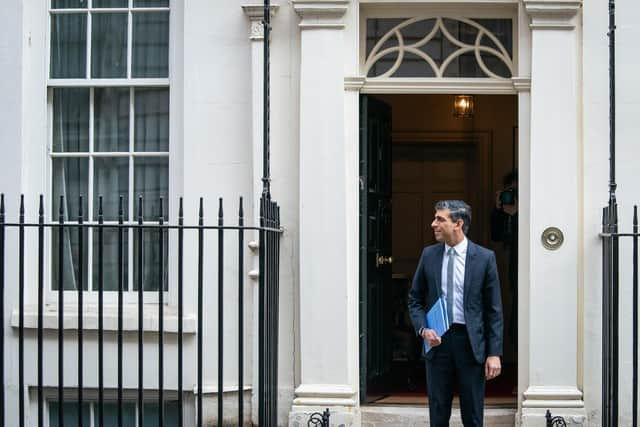Spring Statement: Rishi Sunak warns country economy could worsen, as he announces fuel duty and National Insurance changes
Delivering this year’s Spring Statement, Mr Sunak announced a reduction in fuel duty, as well as a lowering of the threshold at which workers start paying National Insurance, following calls from across the Commons for the Government to do more about the cost of living.
There was also a promise that the basic rate of income tax will reduce from 20p per £1 to 19p in the next two years, however, the Health and Social Care levy will still come in next month.
Advertisement
Hide AdAdvertisement
Hide AdMr Sunak said this afternoon: “The OBR has not accounted for the full impacts of the war in Ukraine and we should be prepared for the economy and public finances to worsen – potentially significantly. And the cost of borrowing is continuing to rise.


“In the next financial year, we’re forecast to spend £83 billion on debt interest – the highest on record. And almost four times the amount we spent last year.”
Announcing the changes in fuel duty, Mr Sunak said the UK Government wanted people to know they will “stand by them” in dealing with rising living costs
“Today I can announce that for only the second time in 20 years, fuel duty will be cut,” he told the Commons.
Advertisement
Hide AdAdvertisement
Hide Ad“Not by one, not even by two, but by 5p per litre. The biggest cut to all fuel duty rates – ever.
“While some have called for the cut to last until August, I have decided it will be in place until March next year – a full 12 months. Together with the freeze, it’s a tax cut this year for hard-working families and businesses worth over £5 billion, and it will take effect from 6pm tonight.”
The earnings threshold for National Insurance Contributions (NICS) will increase by £3,000 from July to £12,570 a year, putting it level with the income tax threshold.
The fuel duty cut and some changes to the NICs system had been expected, however, there had been little prediction of any changes to income tax.
Advertisement
Hide AdAdvertisement
Hide AdThe Richmond MP told the House: "A clear goal for Conservative chancellors, and even some Labour ones, has been to cut income tax. The fact this has only happened twice in 20 years tells you how hard it is to do.
“Covid and the war in Ukraine have only added to the difficulty of achieving this by the end of this Parliament.”
Mr Sunak added: “It would clearly be irresponsible to meet this ambition this year – and yet I refuse to let that ambition wither and drift. By 2024, the OBR currently expects inflation to be back under control, debt falling sustainably, and the economy growing. Our fiscal rules are met with a clear safety margin.
“So, my final announcement today is this: I can confirm, before the end of this Parliament, in 2024, for the first time in 16 years, the basic rate of income tax will be cut from 20 to 19p in the pound.
Advertisement
Hide AdAdvertisement
Hide Ad“A tax cut for workers, for pensioners, for savers. A £5 billion tax cut for 30 million people. It is fully costed and fully paid for in the plan announced today.”
Mr Sunak pointed the finger towards the Russian invasion of Ukraine as he discussed the rising cost of living, and said the UK’s actions against Putin are “not cost-free for us at home” and told MPs they present a “risk” to the post-pandemic recovery."
He said the Office for Budget Responsibility (OBR) has recognised there is an “unusually high uncertainty around the outlook”, adding: “It is too early to know the full impact of the Ukraine war on the UK economy.
“But their initial view, combined with high global inflation and continuing supply chain pressures, means the OBR now forecast growth this year of 3.8 per cent.
“The OBR then expect the economy to grow by 1.8 per cent in 2023, and 2.1 per cent, 1.8 per cent and 1.7 per cent in the following three years.”